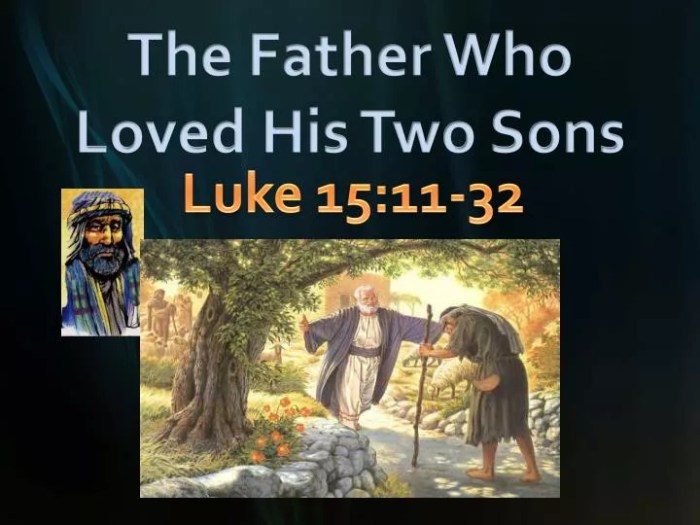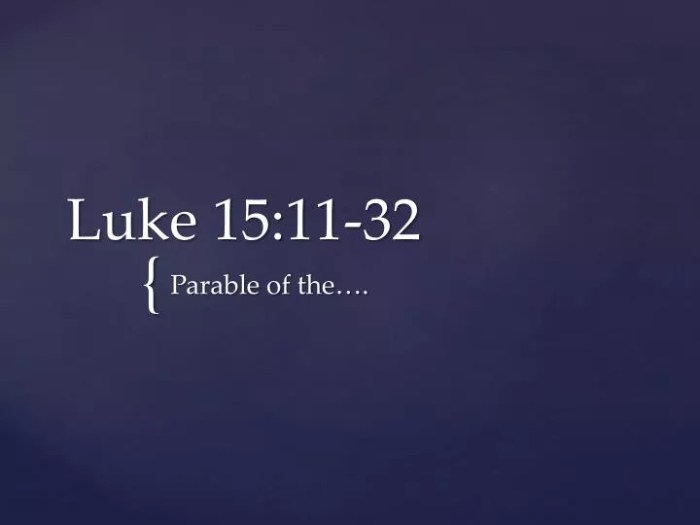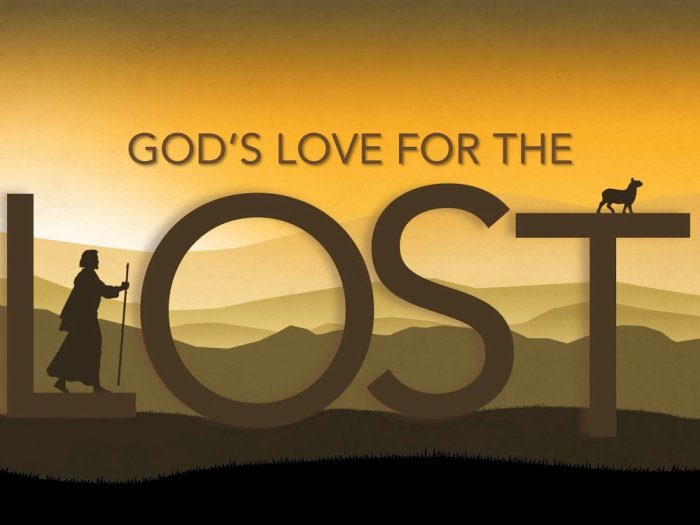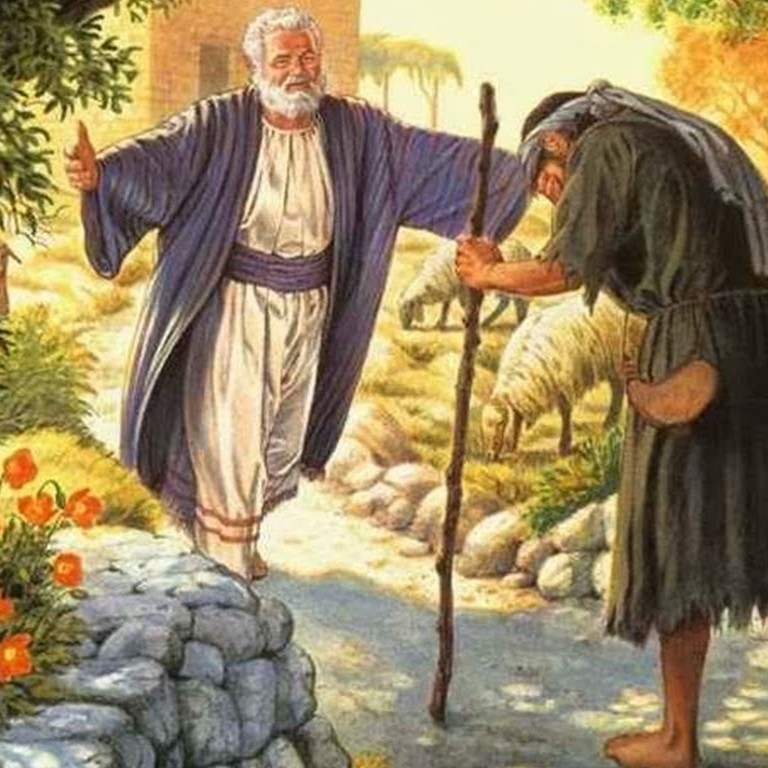Luke 15:11-32 Bible study questions delve into three parables that illuminate the profound nature of God’s love, forgiveness, and restoration. Through the poignant stories of the lost son, the lost sheep, and the lost coin, we gain invaluable insights into the depths of God’s grace and the transformative power of redemption.
These parables have captivated readers for centuries, offering a timeless message of hope and reconciliation. They challenge us to reflect on our own spiritual journeys and inspire us to embrace God’s boundless love and forgiveness.
Introduction

Luke 15:11-32 presents the parable of the prodigal son, a well-known story about a son who leaves home, squanders his inheritance, and eventually returns home to his father’s forgiveness.
This parable is part of a series of three parables in Luke 15 that Jesus tells to illustrate God’s love and forgiveness for sinners. The parable of the lost sheep (Luke 15:3-7) and the parable of the lost coin (Luke 15:8-10) precede the parable of the prodigal son.
Context
The parable of the prodigal son is set within the context of Jesus’ ministry in Galilee. Jesus has been preaching and teaching throughout the region, and he has attracted a large following of people, including tax collectors and sinners. The Pharisees and scribes, who are the religious leaders of the day, are critical of Jesus for associating with such people.
In response to their criticism, Jesus tells the parable of the prodigal son. This parable shows that God’s love and forgiveness are available to all people, even those who have sinned greatly.
Parable of the Lost Son: Luke 15:11-32 Bible Study Questions

The parable of the lost son is one of the most well-known and beloved stories in the Bible. It is a story about a young man who leaves home, squanders his inheritance, and then returns home to his father’s forgiveness.
The parable is a powerful allegory of God’s love for us. It shows us that no matter how far we stray from Him, He is always waiting for us to return. He is a loving Father who is always ready to forgive us and welcome us back into His family.
Characters and their Roles
The parable of the lost son has several main characters:
- The fatherrepresents God. He is a loving and forgiving father who is always waiting for his son to return.
- The younger sonrepresents those who have strayed from God. He is a young man who leaves home and squanders his inheritance. However, he eventually comes to his senses and returns home to his father.
- The older sonrepresents those who have never strayed from God. He is a righteous man who has always obeyed his father. However, he is jealous of his younger brother when he returns home.
Significance of the Son’s Journey and Return, Luke 15:11-32 bible study questions
The son’s journey and return is a powerful allegory of our own journey back to God. We all have sinned and fallen short of God’s glory (Romans 3:23). However, God is always waiting for us to return to Him. He is a loving Father who is always ready to forgive us and welcome us back into His family.
The son’s return is also a reminder that we are never too far from God’s reach. No matter how far we have strayed, He is always waiting for us to come home.
Father’s Response to His Son’s Return
The father’s response to his son’s return is a powerful example of God’s love for us. The father does not condemn his son for his sins. Instead, he welcomes him back with open arms.
The father’s response is a reminder that God is always ready to forgive us. No matter what we have done, He is always waiting for us to come home. He is a loving Father who is always ready to welcome us back into His family.
Parable of the Lost Sheep

The Parable of the Lost Sheep is a powerful story that illustrates God’s love and forgiveness. It tells the story of a shepherd who has 100 sheep, but one of them goes astray. The shepherd leaves the 99 sheep and goes out into the wilderness to search for the lost one.
The Shepherd’s Search for the Lost Sheep
The shepherd’s search for the lost sheep is a metaphor for God’s search for lost humanity. Just as the shepherd was determined to find his lost sheep, God is determined to find and save lost people.
The shepherd’s search is also a metaphor for the way that God loves us. God loves us unconditionally, even when we go astray. He is always there for us, waiting to welcome us back.
The Significance of the Sheep’s Return to the Fold
The sheep’s return to the fold is a metaphor for the salvation of lost people. Just as the sheep was welcomed back into the fold, God welcomes lost people back into his family.
The sheep’s return to the fold is also a metaphor for the joy that God experiences when lost people are saved. Just as the shepherd rejoiced when he found his lost sheep, God rejoices when lost people are saved.
Implications of the Parable for God’s Love and Forgiveness
The Parable of the Lost Sheep teaches us that God loves us unconditionally and is always there for us. He is waiting to welcome us back into his family, no matter how far we have gone astray.
The parable also teaches us that God is a forgiving God. He is willing to forgive our sins and give us a fresh start.
Parable of the Lost Coin

In this parable, Jesus presents a woman who loses one of ten coins, a valuable possession. Determined to find it, she diligently searches her house, sweeping every nook and cranny until she finally locates the lost coin.
Significance of Finding the Lost Coin
The discovery of the lost coin brings immense joy to the woman. She rejoices not only because she has recovered her valuable possession but also because of the symbolic significance it holds. The coin represents a lost soul, and its recovery signifies the restoration of a sinner to God’s grace.
Parallels with Other Parables
This parable shares similarities with the parables of the Lost Son and the Lost Sheep. In all three parables, a valuable possession is lost and then found. The emphasis is on the joy of finding what was lost, symbolizing God’s compassion and willingness to forgive and restore sinners.
Themes and Applications

The parables of the lost son, lost sheep, and lost coin share several central themes, including God’s love for all people, the importance of repentance and forgiveness, and the joy of restoration.
Practical Applications
These themes have practical applications for Christian living:
- God’s Love:We are all loved by God, regardless of our past mistakes.
- Repentance and Forgiveness:We can repent of our sins and receive God’s forgiveness, which brings healing and restoration.
- Joy of Restoration:There is great joy in heaven when a sinner repents and returns to God.
Hope and Restoration
These parables can inspire hope and restoration:
- Hope:Even when we have lost our way, there is always hope for restoration through God’s love and forgiveness.
- Restoration:God desires to restore us to a right relationship with Him and with others.
Frequently Asked Questions
What is the central theme of the parable of the lost son?
The parable of the lost son illustrates the boundless love and forgiveness of God, who welcomes back his repentant children with open arms.
How does the parable of the lost sheep demonstrate God’s care for his people?
The parable of the lost sheep emphasizes God’s unwavering pursuit of those who have strayed from his path, demonstrating his deep concern for each individual soul.
What is the significance of the lost coin in the third parable?
The lost coin represents the preciousness of each individual in God’s eyes, regardless of their perceived worth or status.
